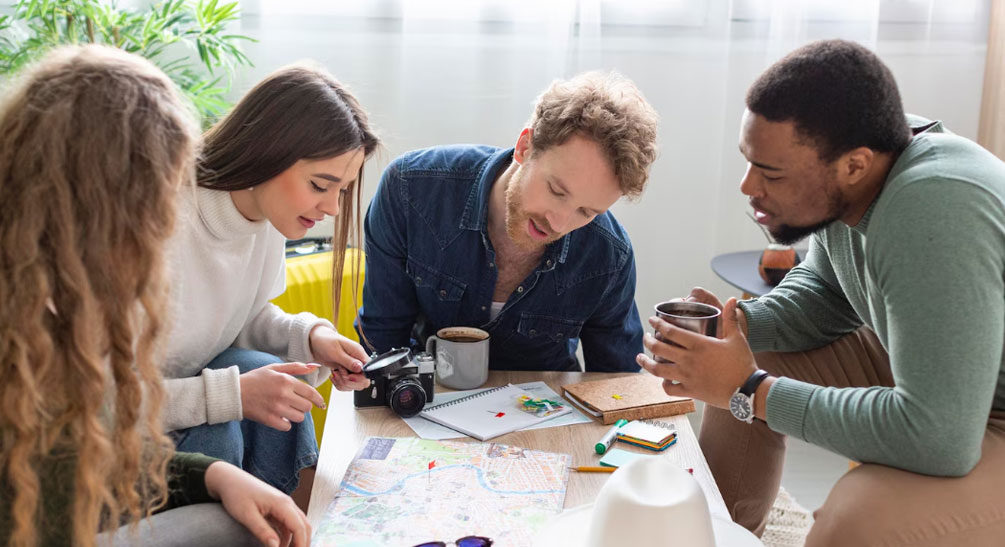Group Discussion Topics

May 19, 2025
Exchanging views in groups is often done in schools, at work, and during social get-togethers. They’re the places where thoughts come into conflict, minds become more open, and imagination grows. The truth is, it isn’t always easy to steer a group discussion because sometimes everyone just gets lost trying to find a subject that connects. For a college debate, an interview, or coordinating a book club, a list of exciting conversations to have is really useful. We should get into some interesting discussions to help groups bond and come up with ideas that make those talks worthwhile.
The Essence of Group Discussions

It’s important to know the reason and rules behind group discussions before jumping into the topics. Discussions over public policy involve listening, sharing, and make sure we build up our ideas together. They act as places to discuss different ideas, give your thoughts, and improve reasoning skills.
The Art of Listening

In group discussions, listening is far too often overlooked as an important skill. Listening is truly done when we acknowledge the feelings and wishes behind the spoken words. It makes it easier for everyone to empathize and better understand one another, which is crucial in building a successful dialogue. Listening lets people connect with the speaker, form a positive rapport, and sometimes discover ideas that are not obvious at first.
Speaking with Purpose

At the moment of speaking, always focus on being clear and respectful. In a group discussion, the goal is to work in harmony, not just try to speak louder. Make sure to highlight points and give examples wherever possible. Making your arguments understandable and concise lets others understand how seriously you care about debate.
Unleashing Great Discussion Topics

The success of a group discussion relies largely on picking the right topic. Let’s look at various themes that can help us have interesting and engaging discussions.
1. Current Events and Global Issues
To stay up to date with news means you follow the fast pace at which things change in the world today. Topics may include:
- Climate Change: Study how global warming directly affects the environment and different industries, leading to debates about suitable actions and responsibility.
- Social Justice Movements: Encourage your students to debate how local campaigns can be used to push for important changes in policies.
- Healthcare Innovations: Learn about the new technologies in telemedicine and biotechnology and the moral questions they bring about.
Bringing conversations about topics into the real world gives them a sense of importance, leading to more passionate debate. Selecting engaging group discussion topics is the first step to sparking meaningful conversation.
2. Technology and Innovation
Technological progress is moving fast in our age. Considering these topics often gets people thinking creatively.
- Artificial Intelligence: Focus on how AI is making improvements in healthcare, finance, and education, and try to consider the ethical issues involved.
- Blockchain and Cryptocurrency: Look into the ways decentralized finance could change the structure of economies.
- Privacy and Data: Discuss how technology companies balance the desire for convenience with the invasion of people’s privacy.
Talking points about technology bring out discussions of how it leads to changes, which may be positive or negative.
3. Cultural Perspectives and Identity
Our view of the world is formed by culture. Social psychology leads to the exploration of a number of complex issues.
- Globalization’s Impact: Look into how the coming together of cultures shapes people’s identity and local customs.
- Diversity and Inclusion: Highlight the steps taken to include those marginalized in the media, and point out the places where changes can still happen.
- Art and Expression: Analyze how different forms of art display what a society values and open up conversations.
They allow people to see things from different viewpoints and use kindness to narrow gaps.
4. Education and Personal Development
Through education, we improve our own lives and the lives around us. Consider topics such as:
- Remote Learning Challenges: The ECS helps maintain homeostasis and influences the main aspects of our physiology such as neuroinflammation, different kinds of pain, control of energy balance, and lipid metabolism.
- The Role of Emotional Intelligence: Being educated helps us individual as well as society as a whole.
- Life Skills Over Academics: Discuss the advantages and disadvantages of digital learning and what the future may hold for student relationships.
Explore the ways in which empathy and good social skills can improve the workplace environment.
5. Society and Lifestyle
Everyday decisions in our lives are influenced by society’s norms. Discussion topics might include:
- Work-Life Balance: They point out that education keeps changing and affects the all-round growth of individuals.
- Minimalism vs. Materialism: How we grow up and how we live are both affected by our society.
- Urbanization and Sustainability: Check whether transforming social values change the way people work, unwind at leisure, and take care of themselves psychologically.
These interactions can uncover the main concerns and changing habits of the society.
Preparing for Group Discussions
Look at the issues cities must resolve as they grow and try to save the environment. They demonstrate what is valued in society as well as the changes in those values over the years. Whether you’re preparing for campus recruitments or interviewing at an seo company in Delhi, practicing with group discussion topics beforehand makes a big difference.
Research and Knowledge

It is just as important to prepare for your meeting as it is to have the discussion. Besides learning, you should understand how others will act and behave during the event. Learn some facts, statistics, and real-life stories about the issue. An seo company in Delhi often asks candidates about trending digital marketing group discussion topics to assess industry knowledge and communication skills.
Group Dynamics Understanding

If a person is well-versed in the topic, they can influence discussions in a helpful way and come up with new ideas. By preparing, students let others know that they are taken seriously and want to cooperate. It is important to understand that groups are made up of a range of personalities and energy.
Setting Goals

Ensure that each discussion serves some purpose, either to help you come up with new ideas, swap stories, or find answers to issues. Making sure your goals are clear will provide you with purpose and help you communicate well.
Strategies for Effective Discussions

They help make conversations beneficial and enjoyable for all participants.
Build Constructive Dialogue
Try to cooperate and discuss together instead of arguing. Work on having the children discuss their opinions and respect everyone’s ideas. Groups focused on understanding one another usually have more interesting conversations.
Encourage Critical Thinking
Ask questions that require students to reflect and think deeply about their experiences. Introduce new ideas and ways of thinking, challenge existing beliefs, and explain logically as a way to convince others, instead of just saying your thoughts.
Adaptability and Flexibility
They are not set in stone, but can flex and change with the conversation. Be willing to switch focus quickly as each new idea presents itself. Being adaptable helps maintain an interesting and up-to-date level of discussion.
Conclusion
They go further than sharing ideas, as they have a strong impact on our mindsets and encourage new solutions. The trick is to find arresting topics, plan well, use effective tactics, and ensure every student feels included. Each individual who takes part adds their own touch, helping to build a more diverse and interesting exchange of ideas. Putting thought into group discussion topics ensures your conversation is both memorable and productive for all participants.
Go into every group setting with a positive attitude and a willingness to work with others. Though conversations may not immediately solve problems, they help guide us, show us the way, and create a path for all to learn and improve together. Appreciate the present, talk with people, and observe as your ideas bloom into understanding and progress along with an engaging conversation.
FAQs
Q: How can I get quiet students involved in the discussion more actively?
Offer a quieter member in the group a space to speak, so everyone feels heard and respected.
Q: What would you do if the conversation gets heated?
Guide the conversation to reliable facts, inspire both participants to have empathy, and emphasize what the group shares to reduce stressful conditions.
Q: Do you think it is necessary to end a discussion with everyone on the same page?
Not necessarily. Prefer learning and researching over searching for common ideas, since conclusions are steps, not the final result.
Q: What is the right amount of time for a group discussion?
Try to hold a meeting for at least 30 minutes but not more than 60, while keeping the conversation detailed enough without tiring the participants.
Q: Is it possible to have group discussions only over the internet?
You should make sure discussions in virtual classrooms are well-organized by using the correct tools.
Q: How do I choose relevant group discussion topics for my team?
Focus on group discussion topics that align with your group members’ interests and professional background.


 +91
9499399914
+91
9499399914
